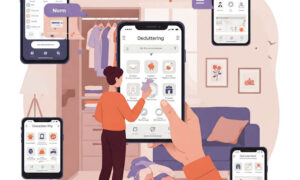The advent of mobile apps signifies a transformative shift in the way businesses operate and interact with their customers. In recent years, mobile applications have become indispensable tools that allow businesses to optimize their processes and enhance customer engagement. As mobile device usage continues to rise, companies have recognized the necessity of integrating mobile apps into their strategies to maintain a competitive edge.
Statistics reveal that mobile applications are not just trends but essential components of modern businesses. According to industry reports, app downloads reached over 200 billion in 2022, reflecting a growing dependency on mobile technology for everyday activities. This trend is underscored by the fact that nearly 90% of consumers prefer using mobile apps for daily tasks such as shopping, banking, and service inquiries. This statistic highlights the increasing expectation for businesses to provide accessible and user-friendly mobile solutions.
Moreover, mobile apps enable seamless communication between businesses and their customers. Through features like push notifications and real-time updates, companies can foster a direct line of interaction with users, resulting in enhanced customer satisfaction and loyalty. Businesses leverage these capabilities not only to maintain relationships but also to gather valuable data on consumer behavior, which can inform product development and marketing strategies.
In addition to customer engagement, mobile applications streamline internal operations. Businesses can utilize mobile platforms for project management, team collaboration, and resource allocation, leading to improved productivity and efficient workflows. The versatility of mobile apps also allows businesses to adapt swiftly to changing market dynamics, catering to consumer preferences in real-time.
In essence, the growing significance of mobile apps in business cannot be overstated. They serve as a crucial link between companies and their consumers, driving engagement, enhancing operational efficiency, and, ultimately, contributing to business scalability and growth.
Enhancing Customer Engagement
In the increasingly competitive landscape of business today, mobile apps are proving to be instrumental in enhancing customer engagement. Mobile applications provide businesses with innovative ways to interact with their customers, fostering a more personalized experience that can significantly improve customer retention and satisfaction. One of the key features of mobile apps is the ability to send push notifications. These notifications enable businesses to communicate real-time updates, special offers, and reminders directly to the user’s device, capturing their attention and encouraging them to engage with the app more frequently.
Moreover, personalization plays a crucial role in customer engagement through mobile apps. By utilizing user data and preferences, businesses can curate content that resonates with individual users. This personalized experience not only enhances user satisfaction but also cultivates a deeper connection between the customer and the brand. For instance, customized recommendations based on previous purchases or behavior patterns encourage users to explore products they are likely to enjoy, thus driving higher engagement levels and potentially boosting sales.
Another significant feature that mobile apps offer is loyalty programs. By integrating loyalty systems within their apps, businesses can incentivize repeat purchases and foster a sense of belonging among customers. Users are more likely to engage with a brand actively when they feel rewarded for their loyalty. This psychological aspect of engagement taps into customers’ desire for affirmation and recognition, ultimately leading to increased brand loyalty and a strengthened customer-brand relationship.
Furthermore, by analyzing user interaction within the app, businesses obtain relevant metrics that can be used to enhance the overall user experience. Understanding what keeps customers engaged enables companies to refine their strategies and adapt to changing consumer preferences. Thus, it is clear that mobile applications are not merely a tool for transactions but serve as a powerful platform for building lasting customer relationships.
Streamlining Operations and Processes
In today’s rapidly evolving business landscape, mobile applications play a crucial role in streamlining operations and enhancing organizational efficiency. These applications provide a wide range of functionalities that are integral to managing workflows, facilitating communication, gathering data, and conducting analytic assessments. By integrating mobile technology into daily operations, businesses can optimize processes and boost productivity across various departments.
One of the key functionalities of mobile apps is their ability to manage project workflows effectively. Applications such as Trello and Asana enable teams to organize tasks, set deadlines, and monitor project progress in real-time. This level of transparency allows for better collaboration among employees, ensuring that everyone is aligned and accountable. Furthermore, the mobile interface ensures that team members can access important updates and communication from virtually anywhere, promoting flexibility and efficiency.
In addition to project management, mobile applications enhance employee communication through tools like Slack and Microsoft Teams. These platforms support instant messaging, video conferencing, and file sharing, thereby facilitating seamless interaction among team members. By reducing reliance on traditional email communication, companies can expedite information sharing and foster a more dynamic working environment.
Data collection and analytics are other essential aspects where mobile apps excel. For instance, apps designed for inventory tracking such as Zoho Inventory and TradeGecko empower businesses to manage stock levels and monitor sales trends effectively. Accurate data capture helps companies make informed decisions and respond quickly to market demands, significantly contributing to operational efficiency.
The integration of mobile applications into business processes not only simplifies operations but also enhances overall performance. The advantages of improved communication, streamlined workflows, and robust data management collectively contribute to a more agile and responsive business model, ultimately fostering growth and scalability in a competitive marketplace.
Expanding Market Reach
In today’s competitive business landscape, reaching a wider audience has become a paramount objective for many enterprises. Mobile applications have emerged as a pivotal tool in this regard, allowing brands to transcend geographical boundaries and connect with users across the globe. With an estimated 3.8 billion smartphone users worldwide, the potential for market expansion through mobile apps is significant. Businesses that leverage mobile platforms can tap into diverse demographics, inviting engagement and fostering customer loyalty.
One of the key advantages of mobile applications is their ability to provide instant accessibility. Users can interact with brands at their convenience, which significantly enhances user experience and satisfaction. Companies can implement localized versions of their apps to cater to different markets, allowing for tailored marketing strategies that resonate with regional preferences. For example, a global retail chain can adapt their application to reflect local languages, currencies, and promotions, thereby facilitating easier transactions and fostering a deeper connection with local consumers.
Case studies from various industries reveal the transformative impact of mobile applications on business growth. A notable example is Starbucks, which successfully scaled its operations through its mobile app. By enabling customers to order and pay for their coffee in advance, Starbucks not only streamlined the purchasing process but also helped the brand capture a larger audience by enhancing convenience. Similarly, Nike leveraged its mobile apps to create a personalized shopping experience, thus increasing customer engagement and driving sales. These instances illustrate how strategic mobile app development can lead to substantial market penetration and business scalability.
In summary, the integration of mobile applications into business strategies offers a multitude of benefits, enabling companies to expand their market reach effectively. Through optimized accessibility, personalized user experiences, and local adaptations, businesses can capture new audiences and foster sustainable growth.
Improving Data Collection and Customer Insights
Mobile applications have significantly transformed the way businesses collect data and derive customer insights. With an increasing number of consumers using mobile devices to interact with brands, businesses can now leverage these platforms to gather valuable information seamlessly. By embedding data collection capabilities directly into the app experience, companies can monitor user behavior, preferences, and feedback in real-time.
One of the prominent advantages of mobile apps is their ability to track user interactions. For instance, businesses can analyze app usage patterns, such as the features that engage users the most, the frequency of app visits, and the time spent on various sections. This data offers invaluable insights that can be utilized to enhance user experience and inform marketing strategies. Additionally, mobile apps allow businesses to implement feedback mechanisms, such as ratings, reviews, and direct feedback forms, encouraging users to share their opinions and suggestions. These insights are crucial for understanding customer satisfaction and identifying areas for improvement.
Furthermore, surveys can also be integrated within mobile applications, granting businesses the opportunity to obtain direct feedback from their target audience. This proactive approach to data collection not only deepens customer engagement but also aids businesses in gathering essential information regarding customer expectations and needs. Consequently, analyzing this data enables organizations to make informed decisions, such as adjusting their products or services to align better with consumer demands.
Incorporating robust data collection tools into mobile apps facilitates a comprehensive understanding of customer behaviors and preferences. As a result, businesses can tailor their offerings and marketing efforts to enhance customer satisfaction effectively. This data-driven approach not only supports long-term growth but also empowers businesses to adapt rapidly in an ever-evolving market landscape.
Boosting Sales and Revenue
Mobile applications have emerged as powerful tools for businesses seeking to enhance their sales and revenue streams. The proliferation of smartphones and the rise of mobile commerce have transformed the way consumers interact with brands, leading to an undeniable correlation between app accessibility and increased consumer spending. This shift has led companies to leverage the functionality of mobile apps to drive sales effectively.
One of the most significant ways mobile apps contribute to revenue generation is through in-app purchases. This feature allows users to buy additional content, features, or virtual goods without leaving the app, effectively enhancing user engagement and boosting revenue. For instance, gaming apps frequently implement this model—players may download the game for free but can purchase in-game items or upgrades that enhance the overall experience, leading to significant financial returns for the developers.
Furthermore, mobile commerce functionalities have revolutionized traditional retail paradigms. Many businesses now integrate shopping capabilities directly into their mobile applications, creating seamless experiences for consumers. By providing users the option to browse, select, and purchase products all within the application, companies can significantly streamline the buying process. For example, retail giants like Amazon and eBay utilize their mobile platforms to attract customers, incentivizing purchases with push notifications that present discounts and offers tailored to user preferences.
Additionally, the implementation of subscription models within mobile apps has allowed businesses to establish steady revenue streams. Applications offering premium content or services can charge users on a recurring basis, thus ensuring sustained profits. Companies in industries like digital media and fitness have successfully adopted this approach, viewing their apps as essential platforms for consistent revenue generation while cultivating customer loyalty by delivering continuous value.
Overall, mobile applications play a vital role in enhancing sales and revenue for businesses. By capitalizing on features such as in-app purchases, mobile commerce, and subscription models, companies can harness the full potential of mobile technology to expand their market reach and drive profitability.
Enhancing Brand Awareness and Loyalty
Mobile applications play a pivotal role in enhancing brand awareness and fostering customer loyalty by providing businesses with a dedicated platform to engage their audience. With the increasing reliance on smartphones, brands are seizing the opportunity to remain relevant and visible to consumers. Mobile apps serve as a direct communication channel, enabling businesses to share updates, offers, and content seamlessly. This consistent interaction not only reinforces brand recognition but also builds a deeper emotional connection with users.
One of the primary branding opportunities within mobile applications is customization. By allowing users to personalize their app experience—such as themes, layouts, or content preferences—businesses can cater to individual needs and preferences. This tailored experience fosters a sense of ownership and belonging among customers, significantly enhancing brand loyalty. Furthermore, integrating features like push notifications can remind users of important updates or promotions, ensuring that the brand remains at the forefront of their minds.
Moreover, businesses can utilize mobile apps to create loyalty programs that reward regular customers. These programs not only incentivize repeat purchases but also encourage users to engage with the brand more frequently. Through gamification elements, such as earning points or badges for actions taken within the app, companies can create a fun and engaging environment, further solidifying customer loyalty. Additionally, user-generated content, such as reviews and testimonials, can enhance trust and credibility, positioning the brand as a leader within its industry.
Incorporating social sharing features within the app can also amplify brand awareness. Encouraging users to share their experiences on social media expands the brand’s reach and exposes it to potential new customers. By leveraging these strategies, businesses can effectively use mobile applications to not only enhance their brand identity but also cultivate long-lasting relationships with their customer base.
Future Trends in Mobile Apps for Business Growth
The landscape of mobile applications is continuously evolving, driven by technological advancements and changing consumer preferences. As businesses seek to leverage mobile apps for growth, several trends are emerging that promise to redefine their importance and role in operational strategies. One significant trend is the incorporation of artificial intelligence (AI) to enhance user experiences and optimize business processes. AI-powered mobile apps can provide personalized services, predictive analytics, and improved customer interactions, which can lead to increased customer satisfaction and retention.
Another crucial development is the integration of augmented reality (AR) within mobile applications. AR is revolutionizing how businesses engage with their customers by providing immersive experiences that were previously unattainable. For example, industries such as retail, real estate, and gaming are utilizing AR to allow customers to visualize products and services in a real-world context, thus enhancing decision-making. As AR technology continues to advance, it is likely to become a staple in mobile applications, facilitating deeper customer engagement and streamlining the purchasing process.
Continuous app development is also becoming paramount for businesses aiming to stay competitive. With the rapid pace of technological changes and evolving consumer expectations, businesses must focus on iterative updates to their mobile applications. This trend encourages not just regular updates to functionality and design, but also the adoption of user feedback to foster a more responsive and user-centric approach. By prioritizing ongoing development, businesses can ensure their applications remain relevant and deliver cutting-edge features that meet the demands of modern users.
In conclusion, future trends in mobile apps for business growth present immense opportunities. By embracing innovations such as artificial intelligence and augmented reality while committing to continuous app development, businesses can enhance operational efficiency, improve customer satisfaction, and ultimately scale their operations effectively in the competitive digital landscape.
Conclusion: Embracing Mobile App Technology
In today’s rapidly evolving digital landscape, the significance of mobile applications for business growth cannot be overstated. Companies that integrate mobile app solutions into their strategies are better positioned to enhance customer engagement, streamline operations, and improve overall efficiency. The advantages offered by mobile apps contribute to a competitive edge, allowing businesses to reach a broader audience and respond more effectively to market demands.
As we have discussed, mobile apps serve multiple functions: from facilitating seamless communication with customers to providing data analysis that aids in informed decision-making. The rise of e-commerce has been greatly influenced by mobile technology, enabling businesses to offer services that are accessible anywhere and at any time. Moreover, with the increasing reliance on smartphones, companies that prioritize mobile-first strategies are likely to see enhanced brand loyalty and improved customer satisfaction.
Furthermore, embracing mobile app technology not only aids in customer acquisition but also in retention. Features such as personalized notifications, loyalty programs, and user-friendly interfaces create a more engaging experience for users, fostering long-term relationships. As businesses scale, the ability to adapt and transform digital strategies becomes imperative. Companies that overlook the importance of mobile applications may find themselves lagging behind competitors who are leveraging this technology effectively.
In light of these developments, it is essential for business leaders to reassess their current strategies and consider how incorporating mobile applications can align with their objectives. The transition to mobile technology is not merely a trend; it is a crucial step towards modernizing business practices in an increasingly mobile-driven marketplace. Organizations that take initiative in adopting and optimizing mobile app solutions will undoubtedly pave the way for sustainable growth and success.




